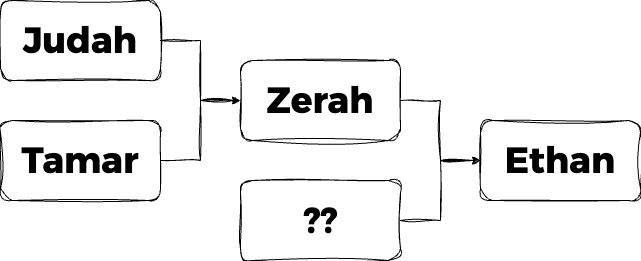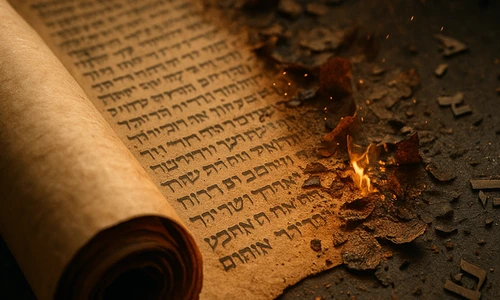Who Was Ethan the Ezrahite? The Bible’s Second-Wisest Man
Ethan the Ezrahite—grandson of Judah and acclaimed worship leader—was called wiser than anyone except King Solomon (1 Kings 4:31). He penned Psalm 89, served alongside Heman and Asaph, and appears in Judah’s genealogy.
But “Ethan” doesn’t come across as a particularly Biblical name.
When we think of Biblical names, we typically mean “Matthew” and “Luke” and “Isaiah” — the people whose names go on books, names you’d recognize even if you didn’t read VerseNotes.
But a man named Ethan wrote Psalm 89, and I want to know who he was.
Let’s start at the beginning: the title of the psalm. It reads,
A Maskil of Ethan the Ezrahite.
Almost two-thirds of the psalms (96/150) have an author listed. In fact, every single psalm in Book 3 (Psalms 73–89) has one, as shown in the table.
| Author | Number | Psalms |
|---|---|---|
| Asaph | 11 | 73–83 |
| Sons of Korah1 | 4 | 84, 85, 87, 88 |
| David | 1 | 86 |
| Ethan the Ezrahite | 1 | 89 |
Nobody really knows what a “Maskil” is—every source I’ve checked says some variation of “probably a musical or liturgical term.” Thanks, experts.
But surely we know who Ethan is.
King David wrote almost half of the psalms, and he’s pretty famous. Other famous psalm authors include King Solomon and Moses. The Sons of Korah, the ancient equivalent of a worship band2, wrote eleven; and Asaph, King David’s music director, wrote twelve more (eleven in Book 3, plus Psalm 50).
So who was Ethan, and what’s an Ezrahite?
Who Was Ethan?

I’ve never heard of Ethan before, so I went the only place I know to go: Scripture itself. A full-text search of Scripture turns up eight references to an Ethan who might be our guy; let’s examine them.
- Psalm 89 Title. This is where we found Ethan in the first place.
- 1 Chronicles 2:6. Ethan, son of Zerah, son of Judah the patriarch by Tamar his daughter-in-law3.
- This Ethan is of the tribe of Judah.
- This Ethan has at least four brothers: Zimri, Heman, Calcol, and Dara.
- This Ethan lived just after the time of the patriarchs.
- 1 Chronicles 2:8. Ethan, father of Azariah.
- This Ethan is the same as two verses ago, but now we’re talking about his son instead of his father and brothers.
- 1 Chronicles 6:42. Ethan, son of Zimmah.
- This Ethan is an ancestor of Asaph, at least nine generations back4.
- This Ethan is a Gershomite, of the tribe of Levi.
- 1 Chronicles 6:44. Ethan, son of Kishi.
- This Ethan is a Merarite, of the tribe of Levi.
- This Ethan lived around the time of King David and King Solomon.
- This Ethan worked alongside Heman “the singer” (1 Chronicles 6:33) and Asaph (1 Chronicles 6:39).
- 1 Chronicles 15:17. Ethan, son of Kushaiah.
- This Ethan worked with “Heman the son of Joel” and “Asaph the son of Berechiah” to play instruments when David brought the ark of the covenant up to Jerusalem.
- This Ethan’s father “Kushaiah” sounds enough like “Kishi” + “iah” (“of God”) that I’m pretty sure it’s a variant of the same name5 from 1 Chronicles 6:44.
- 1 Chronicles 15:19. Ethan, the singer.
- This Ethan is the same as two verses ago.
- 1 Kings 4:31. Ethan the Ezrahite.
- This Ethan is an Ezrahite, the same title given to the author of Psalm 89.
- This Ethan is someone wise enough to be compared with Solomon.
- This Ethan is a son of Mahol.
- This Ethan is the brother of Heman, Calcol, and Darda.
It sounds like there are three Ethans mentioned in Scripture:
- Ethan the Gershomite, an ancestor of Asaph who lived between the patriarchs and David.
- Ethan the Merarite, a Levite who assisted with musical worship in the court of King David.
- Ethan the Ezrahite, the grandson of Judah the son of Jacob, a man so wise he was compared favorably to Solomon; the author of Psalm 89.
I’m fairly sure we’ve found our man. It’s impressive indeed that when the author of 1 Kings was trying to explain the wisdom of Solomon, he had to go back centuries to find someone comparable—and he found Ethan.
Those last two Ethans are awfully similar, by the way: one is the author of a psalm; the other is a worship leader who sang psalms in the temple. One has a brother named Heman; the other has a close colleague named Heman who is often called his brother.
Now that we’ve found him, there are only two problems left to resolve.
First, the Ethan of 1 Chronicles 2:6 is the son of Zerah, but the Ethan of 1 Kings 4:31 is the son of Mahol. How can they be the same Ethan?
It turns out Mahol means “dance” in Hebrew, so Ethan, Heman, Calcol, and Darda6 were possibly both famously wise and also worship leaders—but dancers, unlike the later Ethan, who was a musician.
Second, what’s an Ezrahite?
What’s an Ezrahite?
There’s no great mystery here, just a language barrier: “Ezrahite” means simply “son of Zerah.”
If not for the incredible similarities between these two Ethans who lived centuries apart—their work as worship leaders and being called “brother” of Heman—and the extremely non-obvious fact that “Ezrahite” is related to “Zerah,” this clue should have immediately clarified for us which Ethan was which.
Getting To Delight
If hunting down the second-wisest man in Scripture and the little-known author of exactly psalm isn’t delightful enough, take a look at the title of Psalm 88:
A Song. A Psalm of The Sons of Korah. To the choirmaster: according to Mahalath Leannoth. A Maskil of Heman the Ezrahite.
Ethan’s brother Heman also wrote a psalm! Two brothers, grandsons of a patriarch, renowned for their wisdom, each wrote a psalm, and both were preserved for more than three millennia right next to each other.
Reflection Questions
- Ethan, Heman, and Asaph formed a creative team across generations. Who are the “Heman” and “Asaph” figures in your life that sharpen your craft or faith, and how can you deepen that collaboration?
- Psalm 89 moves from God’s steadfast love to a raw lament over crushed hopes. When have you wrestled with that tension—believing God’s promises while feeling abandoned—and how did honest worship reshape your perspective?
- Solomon’s wisdom produced proverbs; Ethan’s produced a communal song. Which gift—clear teaching or evocative art—most resonates with you as you serve others, and why?
- Ethan is yet another glorious outcome of Judah’s scandalous affair with Tamar. How might God be redeeming the messy chapters in your own family story for future blessing?
-
Psalm 88 is ascribed to both “the Sons of Korah” and “Heman the Ezrahite.” ↩
-
They’re also a modern worship band. ↩
-
A fascinating, tragic, sordid story that’s out of scope for this article. ↩
-
The text lists exactly nine generations, but Old Testament genealogies famously leave out generations when it’s convenient. For example, in this case, there are exactly fourteen generations between Levi and Asaph, and fourteen is twice seven, and seven is a symbolic number for God. ↩
-
Sure enough, my concordance agrees: Kishi means “bow” and Kushaiah means “bow of God.” ↩
-
Their fifth brother Zimri is only listed as a son of Zerah, not of Mahol. Either he chose a different path in life, or he died young. ↩




